
Here’s the new CEMP research bulletin – several projects underway and some new opportunities included.
Usual terms apply, contact Julian or Richard in CEMP or the CEMP Fellow in your group or CEL to chat about anything here.
Latest research and knowledge exchange news at Bournemouth University

Here’s the new CEMP research bulletin – several projects underway and some new opportunities included.
Usual terms apply, contact Julian or Richard in CEMP or the CEMP Fellow in your group or CEL to chat about anything here.
The third book in Professor Tom Watson’s edited world history of public relations series, Middle Eastern and African Perspectives on the Development of Public Relations: Other Voices, has arrived.
Ten chapters from Turkey to South Africa and the Arab Gulf to Nigeria are covered by 14 authors.
The next book in the series, Latin American and Caribbean Perspectives, is due for online publishing by Palgrave Macmillan in its Pivot series next week. The hard copy will follow in 3-4 weeks’ time.
And the manuscript on Western European Perspectives will be submitted next week, too.
The Bournemouth University and Poole Hospital research team who developed a medical device to make epidurals safer and more effective, were celebrating being shortlisted for the THE Awards 2014 in London last night.
The project was nominated for Outstanding ICT initiative of the Year and – although pipped to the post by the Open University – being shortlisted for an award of this calibre is an incredible achievement and honour.
BU’s Pro Vice-Chancellor for Research and Innovation Professor John Fletcher was at the ceremony. He said: “Congratulations to the NHS-BU team for being shortlisted. We were very worthy contestants. I felt privileged and proud to share the evening with such a successful team.”
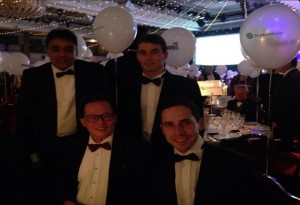 The clinical project was initially proposed by the senior consultant anesthetist at Poole Hospital, Professor Mike Wee. The device was developed by Dr Neil Vaughan for his PhD, supervised by Professor Wee and Dr Venky Dubey. Dr Richard Isaacs – now at Southampton General Hospital – was also part of the research team. All four, pictured here, were at the awards ceremony, along with colleagues from across the university who have supported this innovative and important project.
The clinical project was initially proposed by the senior consultant anesthetist at Poole Hospital, Professor Mike Wee. The device was developed by Dr Neil Vaughan for his PhD, supervised by Professor Wee and Dr Venky Dubey. Dr Richard Isaacs – now at Southampton General Hospital – was also part of the research team. All four, pictured here, were at the awards ceremony, along with colleagues from across the university who have supported this innovative and important project.
Comedian Jack Dee hosted proceedings, sharing his unique and entertaining take on the Higher Education sector!
A full list of categories and winners can be viewed on the THE website. The event organisers also took over £9000 in donations for the Institute of International Education’s ‘Scholar Rescue Fund’; a charity that has led global efforts to rescue threatened scholars and students.
Congratulations to all nominees and winners and thank you to THE for such organising such a fabulous evening!
Image: (Top left clockwise) Dr Venky Dubey, Dr Neil Vaughan, Dr Richard Isaacs, Professor Mike Wee.
Just over a month ago we held a very successful meeting bringing together consumer researchers from a wide range of disciplines across the University. Our ‘Hands-On Information Sharing Session’ made it clear that there was tremendous potential for cross-disciplinary research and that as a united group we could not only act as a forum for research and ideas but also to provide a platform for interaction with industry.
This is a reminder that our next meeting is going to be held on:-
Wednesday, 3rd December in CG01, Christchurch House between 3-5pm. [Please note the change in venue.]
Anyone who is doing consumer research of any description is welcome (e.g. consumer behaviour, retail, marketing, advertising, psychology, consumer neuroscience …) and there will be coffee and mince pies to help our consumer thinking along.
At this meeting we will be begin to identify groups or clusters of researchers, to discuss potential collaborations, and discuss plans for the future.
So if you think this might be of interest, please do come along next Wednesday. If you are unable to make this meeting but are interested in being involved please email us to let us know and we will keep you informed about future events.
Jeff Bray (Tourism; jbray@bournemouth.ac.uk) Juliet Memery (Business School; jmemery@bournemouth.ac.uk) Janice Denegri-Knott (Media School; JDKnott@bournemouth.ac.uk) Siné McDougall (SciTech; smcdougall@bournemouth.ac.uk)
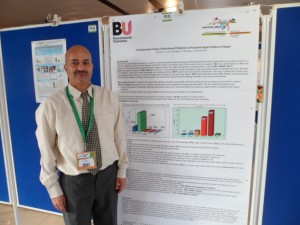
HSC PhD student Jib Acharya presented the preliminary results of his thesis research in a poster presentation entitled “A Comparative Study on Nutritional Problems in Preschool Aged Children of Nepal”
The poster was accepted at the 3rd World Congress of Public Health Nutrition Conference in Gran Canaria, Spain, 2014.
Mr. Acharya’s poster was displayed as a traditional paper poster but also a digital poster on television screens around the conference. The thesis work is supervised in the School of Health & Social Care by Dr. Jane Murphy, Dr. Martin Hind and Prof. Edwin van Teijlingen. The attendance of this conference was made possible due to the support of a Santander award.
Congratulations
Prof. Edwin van Teijlingen
CMMPH
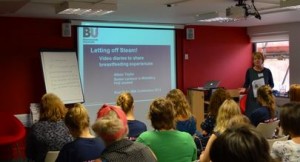
Congratulations to Alison Taylor, senior lecturer in midwifery who presented preliminary findings of her PhD as keynote speaker last month at the Cornwall Real Baby Milk conference. Alison’s presentation ‘Women’s Breastfeeding Experiences – shared using video diaries’ was very well received. Alison’s fieldwork has been supported by the Iolanthe Midwifery Trust , she received the first Tricia Anderson award in 2008. Founded in 1983, the Trust supports midwives and student midwives to undertake further education and to carry out projects designed to improve the care of mothers and babies.
More details on the conference can be found at:
http://realbabymilk.org/couldnt-make-real-baby-milk-cornwall-conference-last-month/
Congratulations!
Prof. Edwin van Teijlingen
Centre for Midwifery, Maternal and Perinatal Health (CMMPH)

Last week Professor Juliet Memery and Dr Dawn Birch from the Business School, supported by the Cyber Security Unit, travelled to Tromso in Norway at the invitation of the University of Tromso. The aim of the trip was to discuss future research collaborations and funding opportunities around the areas of food security, food crime, food waste and technology with a particular emphasis on fish and seafood.
Whilst there Juliet and Dawn met with academics from the University of Tromso, including Professor Svein Ottar Olsen and Professor Kåre Skallerud, as well as Pirjo Honkanen, Director of Research (Consumer and marketing research) and Petter Olsen, senior scientist, from Nofima, one of the largest institutes for applied research within the fields of fisheries, aquaculture and food industry in Europe. A series of research presentations revealed a number of areas of mutual interest which will be scoped out and explored further with a view to securing EU/Research Council funding. Additionally they met with analysts at the Head Office of the Norwegian Seafood Council to discuss their role and research in the seafood industry and explore potential opportunities for them to be included in future research collaborations.
Overall it was a very successful networking trip, and a reciprocal visit to Bournemouth is anticipated in the coming months to further strengthen relationships and collaborations.
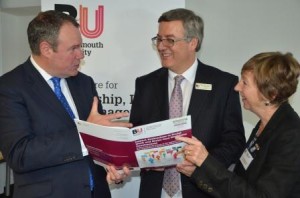
A centre to provide leadership and management development opportunities and support across the health and social care sector has been launched at BU.
The Centre for Leadership, Impact and Management in Bournemouth (CLiMB) offers a range of development options – including leadership and management programmes; coaching and mentoring development; accreditation for in-house programmes; and consultancy, research and impact evaluation.
Director of CLiMB Professor Keith Brown said: “CLiMB is being launched to bring together Bournemouth University’s strengths of research, consultancy and education in the leadership of health and social care services. “Never before have these services been under the level of financial pressure and public scrutiny that they are currently, coupled with increasingly high public expectations for quality services. “These needs and demands can only be met by better leadership at all levels within the health and social care sector.”
The centre has been launched after more than five years of research and development in the field of leadership and management in health and social care. Professor Brown was asked by the government’s Social Work Reform Board, established following the death of Peter Connelly, to develop a leadership pathway for social work managers.
This was extensively evaluated for impact and then adapted for healthcare in response to the Francis report at Mid Staffordshire Hospital.
The Centre was officially opened on 12th November by Bournemouth West MP Conor Burns, who said: “Too often in health and social work, organisations have become too immersed in process and procedure that they lose sight sometimes of the outcome. We should be proud of what Keith and the team do in terms of outcomes for people… making a contribution emotionally and economically.”
Sue Sutherland OBE, Chair of BU’s Board and former Chief Executive of Poole Hospital, said: “The launch of this centre is really important. It is absolutely rising to the challenges that the sector faces, helping to develop the best health and social care service that’s borne out of leadership at every point of the sector.”
CLiMB currently receives HEIF funding. Higher Education Innovation Funding aims to support and develop a broad range of knowledge-based interactions between universities and colleges and the wider world, which result in economic and social benefit to the UK.
 Staff and students are invited to join us for the next cyber security seminar on:
Staff and students are invited to join us for the next cyber security seminar on:
‘Secure and cross border digital identity: issues and perspectives’
Tuesday 25th November, 4pm – 5pm
Room: P335
The talk will discuss requirements, issues and perspectives for an interoperability solution that allows citizens and organizations to establish new e-relations across borders, just by presenting their national eID.
Our speaker will be Dr Andrea Atzeni, from the “Dipartimento di Automatica e Informatica, Politecnico di Torino” who is based in the TORSEC Security group.
Dr Atzeni’s work addresses the definition of security requirements and mobile security, plus, investigation and modelisation of user expectation on security and privacy; risk analysis and threat modeling for complex cross-domain systems; specification of functional and security architectures; development of cross-domain usable security; development and integration of cross-border authentication mechanisms (including legal and technical issues).
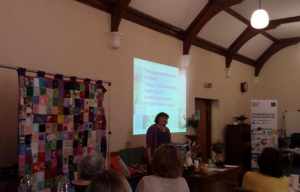 On 5th November Jenny Hall, Senior Midwifery Lecturer, presented at an event organised for the ‘Thinking Futures’ festival for the University of Bristol. http://www.bristol.ac.uk/fssl/festival/
On 5th November Jenny Hall, Senior Midwifery Lecturer, presented at an event organised for the ‘Thinking Futures’ festival for the University of Bristol. http://www.bristol.ac.uk/fssl/festival/
The festival was an eleven day series of lectures to share and celebrate research from the Faculty of Social science and Law and had sponsorship from the ESRC Festival of social science. The sponsorship meant that it was open to the public and therefore anyone could turn up.
The day was called ‘Patchwork, quilting and keeping it all going’ and arranged by inspirational Management academic and quilt researcher Ann Rippin http://annjrippin.wordpress.com/ Ann placed in social and historical context the study of quilting and the history of quilters, identifying the lack of research around this significant social activity. Harriett Shortt from the business school at UWE Bristol shared how she had developed a quilt as a response to her PhD studies.
http://harrietshortt.wordpress.com/ Jenny also talked about the process of reflexivity in her EdD study around developing her quilt as well as the creation of ‘text quilts’. The audience included researchers as well as members of the public active in stitching. Overall it was a day that stimulated a lot of discussion around the use of creative craft in life as well as research and highlighted the need for more work around quilters to be carried out.
Academics from Erasmus University, Rotterdam, the Netherlands joined fellow researchers at Bournemouth University for a two day workshop on November 6-7. The workshop focused on organizational behaviour and legal development.
Presentations ranged from examining corruption in terms of foreign owned firms paying bribes and organizational wrong doing to legal issues involving IP issues and trademark violations at the London Olympics.
Bournemouth University PhD candidate, Nick Coppola, presented his paper “EU competence in IP matters: the strange case of geographical indications”. Coppola’s presentation explored the division of competencies between the European Union and its member states with regards to an often controversial form of intellectual property.
“I am presenting this paper again to the Italian Association of Agricultural Lawyers November 27 in Rovigo, Italy, so the opportunity to get feedback from colleagues in a smaller forum prior to the conference will help me to respond to potentially difficult questions from subject matter experts,” said Coppola. “Additionally, it was a good opportunity to discuss my paper with professors and peers who take a different approach to law. This has helped me to consider my research from an alternative perspective.”
Legal issues were further addressed when Dr. Lingling Wei presented her joint paper with Erikson about the event specific legislation for mega sporting events. Their paper intersects social sciences discussions with legal analysis.
“I think these interdisciplinary research workshops are a good way to work outside of the restriction of the legal field and have a good interaction with the social scientist,” added Wei.
Organizational behaviour was also explored at the workshop. Erasmus University Rotterdam candidate, Shaheen Naseer, presented her paper “Bureaucratic power and corruption, Imprinting of the past” which gave a contextual overview of how Pakistan’s bureaucracy has been influenced during its time as a British colony.
“The conference was a great opportunity for me to interact with academics from diverse backgrounds,” said Naseer. “The papers were at the forefront of knowledge and the floor discussions helped cross-fertilization of ideas. The conference was held in an atmosphere of collegiality and I enjoyed the great hospitality of the organizers”
Dr. Fabian Homberg, Bournemouth University and Prof. Klaus Heine, Erasmus School of Law, have started these workshops in 2011 as an informal way to foster intellectual exchange and to develop interdisciplinary research projects. This initiative will continue in the future and has also resulted in an ERASMUS+ Agreement between BU’s Business School and Erasmus School of Law which is active since the start of this academic year (2014/2015). This means exchange opportunities for undergraduates, post-graduates and post-graduate researchers and staff are now available between these two institutions.
In November last year I published a blog on the first pilot project I undertook with five under-graduate pre-registration midwifery students which was designed to enable them to qualify with the skills and competencies around examination of the newborn (EXON). The students were required to access and study the module with post-graduate midwives. Four of the students successfully completed the course in September 2014 with one student leaving early on in the project due to unforeseen family circumstances. The journey to completion was not smooth. The first hurdle was a clash of assessments. The EXON assessment (a presentation) fell in the same week as Complex Care (CC), a third year unit assessment where students are required to undergo a VIVA and manage two obstetric emergencies. It is a stressful experience and therefore three of the students requested an extension to their EXON presentation with only one choosing to present with her post-registration colleagues. As the EXON assessment took place on the Monday of that particular week and Complex Care assessments were running over three days, the student managed to negotiate to undertake her CC assessment on the Friday. The three students were re-scheduled to present later in the year with a number of other midwives who were on extensions or resits. One of the advantages of choosing to present in January 2014 was that the student was able to choose a topic that she could use both for her learning around EXON and for her extended essay which was due to be completed somewhat later in the academic year. The student was successful in both endeavours as were all the others but at a later date.
Another hurdle students found themselves confronted with, was a lack of opportunity to undertake newborn examinations including a shortage of midwifery mentors who could support the training requirements of the project. Two of the students could not get any of the examinations done in their own trusts. Fortunately for them, the maternity unit and midwifery staff at Poole NHS Trust Hospital were extremely obliging and supported the students to work there which enabled them to complete the practical newborn checks. All four of the students have successfully qualified as midwives and have obtained midwifery posts in the local area. They remain committed EXON and have volunteered to be EXON ‘champions’ within their respective trusts. I am grateful to Jeanette Elliot, Luzie Schroter, Jenna Penhale and Bex Coleman-Moss for their hard work and dedication during the pilot and for their feedback and advice for the next intake.
Demand for places for the second pilot project remained high when the call was put out a short while ago. Unfortunately due to some of the barriers described above it was only feasible to recruit five students again and all of them based in the west. The students have commenced their studies and are enjoying the learning so far. The pilot projects are helping to inform what impact these barriers will have on the training needs for midwifery students within our local maternity units as this year we are introducing EXON theory to all midwifery students on our newly validated curriculum with the caveat that students will obtain the necessary theoretical knowledge but not all with qualify with the required skills. However by ‘fast-tracking’ students onto one of our twice yearly CPD EXON modules which has around 20+ midwives enrolled, by the time the students reach their third year there should be many more midwives qualified in EXON and in place to support our under-graduate students to gain the competencies around newborn examination. If you require any further information please contact Luisa Cescutti-Butler on lcbutler@bournemouth.ac.uk
HSC postgraduate student Rachel Arnold just had the first paper from her research in Afghanistan accepted by the scientific journal BJOG. Her paper analyses the culture of a Kabul maternity hospital to understand its impact on the care of perinatal women and their babies. A heavy workload, too many complicated cases and poor staff organisation lead to a low quality of maternity care. Cultural values, social and family pressures influenced the motivation and priorities of healthcare providers.
The centrality of the family and family obligations in Afghan society has emerged as a major theme. Another theme is the struggle for survival – as health care providers work to support their families, to maintain the power that they have, and to survive within a hospital system where fear rather than compassion appears to drive and motivate. Rachel presented some of the key issues at the 2013 GLOW conference in Birmingham. Rachel is supervised by Professors Immy Holloway, Kath Ryan (LaTrobe University, Australia) and Edwin van Teijlingen.
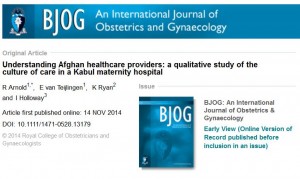
Rachel’s paper Understanding ‘Afghan healthcare providers: a qualitative study of the culture of care in a Kabul maternity hospital’ can be found here. The paper is Gold Open Access.
Prof. Edwin van Teijlingen
Centre for Midwifery, Maternal & Perinatal Health
Research from staff in the Centre for Midwifery, Maternal & Perinatal Health (CMMPH) was well represented at this week’s Royal College of Midwives Conference (RCM). The RCM Conference 2014 held in the International Centre Telford explore the theme Better Births: United in Excellence. At this midwifery conference HSC Dr. Sue Way chaired a session on ‘Perineal Care and the Management of the Second Stage’
Dana Colbourne, Postgradute student at Bournemouth University and midwife at Portsmouth Hospitals NHS Trust presented a poster with the title ‘PhD student Leading the way – A case study of a student midwife led postnatal clinic’.
Dr Stella Rawso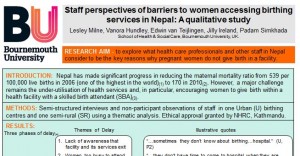 n, senior lecturer in midwifery presented her poster ‘Listening to Women: Exploring women’s experiences of being part of a student midwife’s caseload’.
n, senior lecturer in midwifery presented her poster ‘Listening to Women: Exploring women’s experiences of being part of a student midwife’s caseload’.
Jan Stoziek, senior lecturer in midwifery and also Prof Doc student at the University of Portsmouth presented her poster ‘Mother’s Experience of Breastfeeding after Breast Cancer’.
Lesley Milne also presented a poster on the work around ‘Staff perspectives of barriers to women accessing birthing services in Nepal: A qualitative study’ with Prof. Padam Simkhada, HSC Visiting Faculty Ms. Jillian Ireland, Prof. Vanora Hundley & Prof. Edwin van Teijlingen,
In the region covered by Health Education Wessex, over half of all admissions to neonatal units are babies who are considered term gestation. An audit of neonatal unit admissions undertaken by University Hospitals Southampton NHS Foundation Trust uncovered three main reasons for term admissions:
The findings suggest that with better care in the immediate and subsequent postnatal period some of these admissions may have been avoided. It appears to be a national problem with NHS England recognizing an increase in term admissions as a key concern. Separating the woman from her baby can be emotionally upsetting and may impact on a woman’s ability to successfully breastfeed her baby. Babies when admitted onto neonatal units are subject to many interventions and may suffer short term morbidities. In addition to the impact on the woman and her baby there are implications for resources, it costs £500 a day to care for a baby receiving specialist neonatal care. Units who have reduced their term admission rates cite midwifery involvement as vital. Midwives work within multidisciplinary teams; therefore involvement of all healthcare professionals is crucial if term admissions are to be reduced. Standardization of protocols and guidelines appear difficult to achieve based on the various ways services are configured, therefore education on the basic principles of prevention is required.
Following an initial meeting with Kate Graham-Williams (Locum Consultant Neonatologist), Kim Edwards (Network Educator) and Teresa Griffin (Deputy Manager/Lead Nurse) to explore ideas of developing a learning package, a further meeting took place with Luisa Cescutti-Butler, Debbee Houghton and Carol Wilkins (Senior Midwifery Lecturers) to discuss educational outcomes.The meeting concluded with all parties agreeing to work collaboratively on an e-learning package and to explore possible sources of funding. Health Education Wessex has a responsibility to ensure that NHS employees are equipped with the right skills and knowledge to deliver excellent health and patient care, therefore they were approached and agreed to provide funding. Alison Potter (E-Learning Project Manager) joined the project and is managing all stages of the project. The project which involves Health Education Wessex, Thames Valley and Wessex Neonatal Network, Bournemouth University and selected supplier (LEO) have agreed to develop, implement and evaluate a multi-disciplinary eLearning module with an aim in reducing avoidable term admissions to neonatal units.
Luisa, Debbee and Carol are working with Kate on developing content (case scenarios) of the e-learning package and a workshop with all parties including supplier LEO will be taking place in December at Bournemouth University. A number of key professionals from the Wessex region have agreed to be reviewers including a set of parents who would have experienced their baby being admitted to a neonatal unit for medical input. The project aims to be ‘live’ in March 2015.
If you require any further information please contact Luisa Cescutti-Butler, Debbee Houghton or Carol Wilkins on the following email addresses: lcbutler@bournemouth.ac.uk, dhoughton@bournemouth.ac.uk , cwilkins@bournemouth.ac.uk
High quality research from a collaboration of three UK universities has been turned into practical advice. The ROMEO project (Review Of Men and Obesity) by the University of Aberdeen, the University of Stirling and Bournemouth University found that men are more likely than women to benefit if physical activity is part of a weight-loss programme. Also although fewer men joined weight-loss programmes, once recruited they were less likely to drop out than women. The perception of having a health problem, the impact of weight loss on health problems, and the desire to improve personal appearance without looking too thin were motivators for weight loss amongst men. However, the type of reducing diet did not appear to affect long-term weight loss.
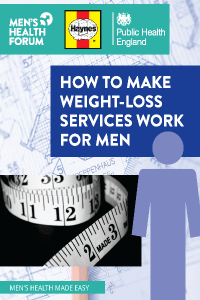
The charity Men’s Health Forum linked up with Public Health England and published a ‘How to’ guide based on the evidence of our ROMEO study. This ‘How to make weight-loss services work for men’ guide offers advice for local authorities, commissioners and weight management providers, who are trying to attract men to weight-loss programmes. The guide highlights, for example that:
Furthermore, this ‘How to’ guide includes, amongst other advice, a list of Ten Top Tips.
This is an excellent example how research conducted between three different universities has been turned into easy to understand advice for man who are overweight. The past decade or so has seen an increasing interest in making academic research ‘useful’ to society. Creating and measuring the impact of research conducted at universities has been introduced as key element on the REF, the Research Excellence Framework. The REF assesses the quality of research in, and affects the amount of government money each university in the UK receives.
For a traditional academic publishing the HTA report would be a success in itself. Which, of course, it is to culmination of a large-scale and extensive review, well conducted, published through Open Access, which also attracted considerable media attention from across the globe when it came out. However, ROMEO did not stop there. Due to the involvement of the Men’s Health Fora right from the start of ROMEO, the Men’s Health Forum in England linked up with Public Health England to create and publish ‘How to make weight-loss services work for men’ guide is published today.
The ROMEO project, led by Prof. Alison Avenell (University of Aberdeen), examined the evidence for managing obesity in men and investigated how to engage men with obesity services. The evidence came from trials, interviews with men, reports of studies from the UK, and economic studies. ROMEO was funded by the National Institute for Health Research, Health Technology Assessment Programme (NIHR HTA Project 09/127/01). Our full report is Open Access and can be freely downloaded here.
Prof. Edwin van Teijlingen
School of Health & Social Care
Bournemouth University

Congratulations to Dr. Sarah Hean in the School of Health & Social Care and her colleagues Staddon, Clapper, Fenge, Heaslip and Jack on the acceptance of their article: ‘Improving Collaborative Practice to Address Offender Mental Health: Criminal Justice and Mental Health Service Professionals’ Attitudes Towards Interagency Training, Current Training Needs and Constraints’ by the Journal of Research in Interprofessional Practice and Education.
The paper is Open Access funded by BU! A copy is available in BU’s repository BURO: http://eprints.bournemouth.ac.uk/21462/
Well done
Prof. Edwin van Teijlingen
CMMPH
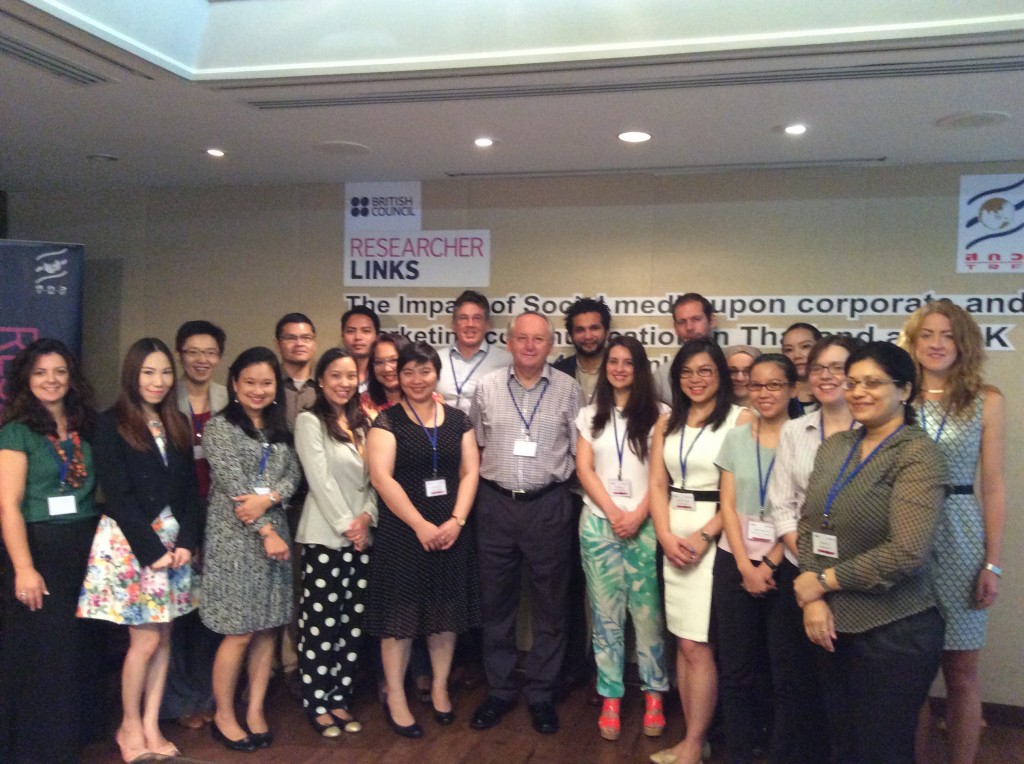
Group photo of the delegates at the opening of the Researcher Links Workshop in Bangkok on November 2
Working with partners at Bangkok’s Chulalongkorn University, a team from BU led and participated in a British Council Researcher Links Workshop in Bangkok from November 2 to 4.
For Professor Tom Watson of the Media School and Associate Professor Jirayudh Sinthuphan of Chula’s Faculty of Communication Arts, it was ‘mission accomplished’, as the Workshop had been postponed twice in February and May because of Thailand’s febrile politics.
“This time, there were no problems as Bangkok was about as quiet as it will ever be,” said Professor Watson. “As a result, the Workshop was attended by representatives of four UK and seven Thai universities who worked very well together”.
From the three days of collaborative working, four projects related the Workshop theme of ‘the impact of social media upon corporate and marketing communication in Thailand and UK’ emerged. They will be developed over the coming months into research actions, bids for funding and publications.
With Professor Watson were Associate Professor John Oliver (Senior Researcher), Dr Ana Adi (Deputy Workshop Coordinator), Dr Tauheed Ramjaun and Mona Esfahani, all from the Corporate & Marketing Communications academic group. Among the Thai participants was Dr Waraporn Chatratichart of the University of the Thailand Chamber of Commerce, who is a PhD alumna from the Media School.
“The Workshop also reinforced the existing relationship between BU and Chulalongkorn University as the Dean of the Faculty of Communication Arts, Dr Duangkamol Chartprasert, and Professor Parichart Sthapitanonda both took part as Senior Researchers,” said Professor Watson. “The BU-Chula relationship has great potential for research collaboration and staff exchanges. I hope that other BU staff will follow the opportunity that the Workshop has opened up.”